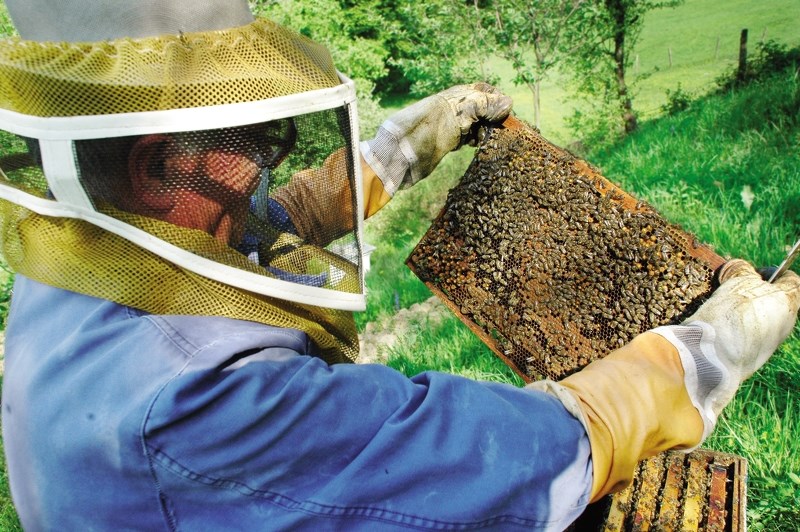There could be more of a buzz around Bonnyville, as town council looks into urban beekeeping.
The idea to allow personal hives in yards was discussed during the Feb. 14 council meeting, after town staff received an inquiry from a local resident. While they haven't made a decision one way or another, Mayor Gene Sobolewski said it's an idea “worth exploring.”
“All we're doing is looking at this, getting information and starting to develop a policy… It happens in other municipalities, we're not reinventing the wheel. We can look at it, and then make decisions in the future once we have more information.”
Urban beekeeping has become somewhat of a trend in recent years, with cities such as Edmonton and Calgary allowing for backyard hives.
“Urban municipalities are finding people want to have small hives in their yards for personal consumption of honey, or they're concerned with the (declining) bee population, which is becoming known around the world. I've taken a look at what Edmonton and Calgary do, and Edmonton does have a good basis to start off of and to use for direction,” director of planning and development Katherine Currie told council.
Currie explained that from the municipality's side, beekeeping policies would be similar to getting a cat or dog licensed. The onus would be put on the person wanting to have the animals to get the necessary paperwork.
“We did look at it during the land use bylaw review, but at that time we didn't feel it should be part of the land use bylaw. It could fall under a combined animal control bylaw, which would consolidate our cat and dog bylaws, the keeping of animals within the town, under one bylaw.”
Beekeeping, regardless of location, already falls under provincial legislation known as the Bee Act. Under this act, anyone wishing to become a beekeeper must abide by regulations set out and be registered annually with the provincial apiculturist.
“There's only a certain timeframe that they take registrations and you can get your bees. It's done on an annual basis, it's not just once and you have that hive forever. Every year you have to register, prove that you have training and that you're taking care of the hives, that sort of thing,” noted Currie.
In addition to the rules set by the province, should council choose to move forward with allowing beekeeping in Bonnyville, Currie recommended they used the City of Edmonton as a guideline for drafting a policy.
Edmonton allows residents to have one active hive consisting of a bottom board cover with four supers. Supers are the boxes that make up a hive, each holds a certain number of frames that the bees use for different purposes. For example a deep super contains the frames that the bees build wax onto while the honey super is where they store the honey.
Edmonton's guidelines further state that hives be located in a rear yard only, at least 25 metres from public places, hive openings be directed away from adjacent properties, and be located at least three metres from all property lines where there is an adjacent neighbour, unless separated by a 1.5-metre high solid fence or vegetative hedge. Beekeepers are also required to complete training courses and provide notice to neighbours.
Local apiarist David Tharle, owner of T&T Apiaries, doesn't want to discourage the idea of beekeeping in town, but stresses the need for education.
“The whole nature of beekeeping has changed quite a bit, 20 years ago I would have encouraged anyone to get a hive. I'm not going to discourage anyone yet, but people really need to review and understand what's all involved in bee management.”
Tharle, who has hives around the area, expressed that there tends to be a “romanticized” view of beekeeping. Running a successful operation requires a lot more work and care than just sticking the bees in a hive.
“The biggest thing in the last 10 to 15 years is the mites and diseases that have made their way to North America. If not properly controlled, you can severely damage, if not totally lose, your bees.”
He added, “Bees are very opportunistic. If somebody has a weak hive, whether it's another in-town beekeeper or a beekeeper like myself that has hives all over the area, our bees will (prey on) that weak hive. They'll quite likely drag whatever parasite or disease back home with them.”
However, when it comes to learning the ins-and-outs of being an apiarist, educational materials can be hard to come by. Tharle explained that since beekeeping varies by region, even resources developed in southern or central Alberta wouldn't necessarily be beneficial to those starting hives locally.
“If you we could find a retired beekeeper that could mentor them, that would be great.”
When it comes to the public safety concerns with having hives in town, Tharle noted it's not the bees you have to worry about.
“As a rule, in most cases, they're not aggressive. It's the wasps and hornets that give flying insects a bad name and people just assume whatever is flying by them is going to bite them. For the most part, bees mind their Ps and Qs.”
With the majority of councillors showing an interest in the possibility of urban beekeeping, town administration will be gathering more information, consulting with experts, and developing a draft policy to be brought before council in the future.



